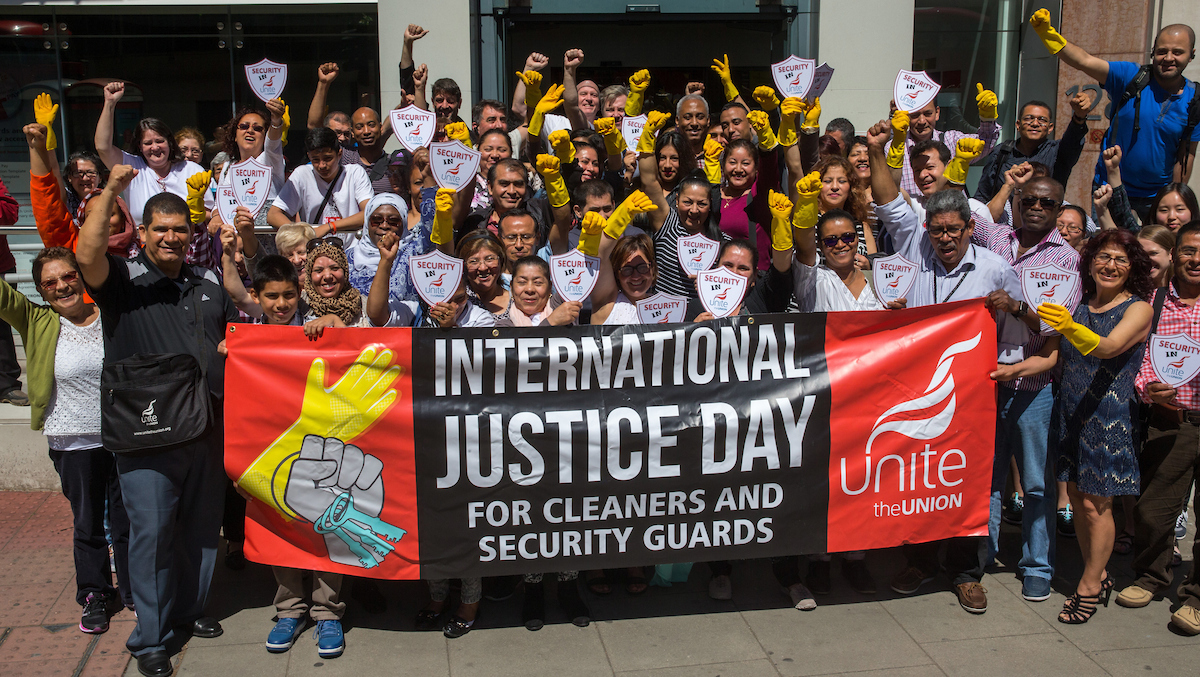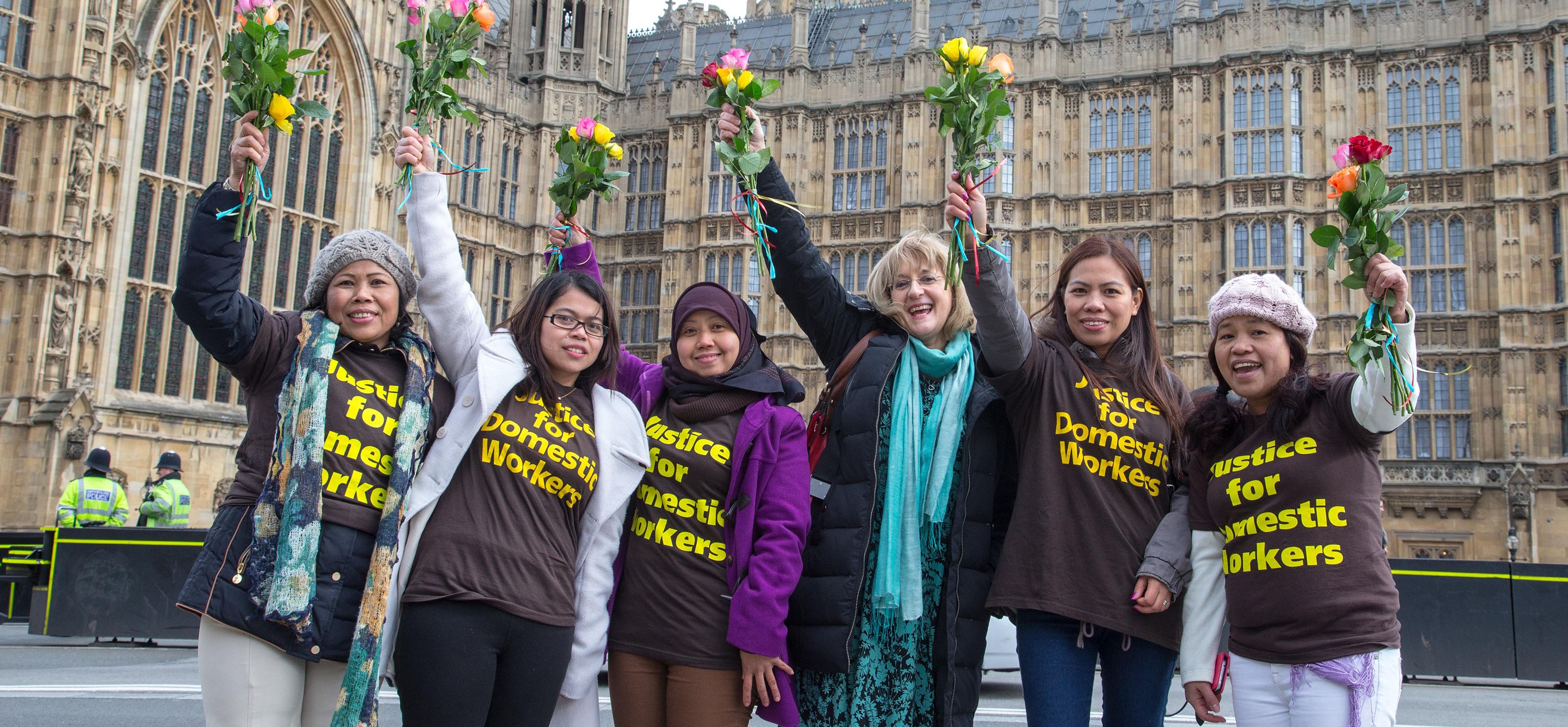Slavery of domestic workers
Today (December 12) marks World Human Rights Day, a day established by the United Nations in 1950 to highlight human rights.
But you don’t have to travel the world over to see these most fundamental rights being stripped away in what amounts to modern-day slavery—it happens right in our own backyard.
Since 2012, migrant domestic workers in Britain are brought in by their wealthy overseas employers under a visa system that effectively ties them to their employer. In other words, they cannot work elsewhere except under the auspices of the person who brought them into the country.
This exposes migrant domestic workers to unspeakable exploitation. Not only is wage theft common, but physical and sexual abuse is rife as well.
Justice 4 Domestic Workers (J4DW), a self-organised branch of Unite, took to the streets in Westminster this morning to fight the visa system that sanctions their modern-day slavery.
With the support of several Labour MPs and other Unite members, the morning of action brought to light the struggles domestic workers face in this country. They called for the reinstatement of the previous visa system, which allowed workers to change employers, in order to undo the worst of the abuses these workers now face.
J4DW chair, Marissa Begonia, argued that the tied domestic worker visa devised by the Tory-led coalition government is morally indefensible.
“For this government to facilitate and tolerate slavery in the UK is an unforgivable crime,” she said.
“When I asked for my salary, he threatened to hit me”
During the demonstration, migrant domestic workers held life-size message boards highlighting the abuse and exploitation they’d suffered.
The stories J4DW’s members tell testify to the heinous conditions they endure daily, with no recourse to a justice system that many of us take for granted.
Chanda* explains how receiving wages that other workers are lawfully entitled to was out of the question under her previous employer.
“I was working from 8am to 1am every day for an entire year,” she said. “My employer promised to pay £400 per month, but whenever I asked for my salary, he threatened to hit me.”
Elizabeth* recounts how, despite the daily abuse she suffered, she couldn’t speak out for fear of losing her visa.
“[My employer’s] kids were spitting at me and pushing me down the stairs,” she says. “But I kept quiet because I needed to renew my visa. My employer kept a diary of things she didn’t think I was doing.
Most horrifyingly of all, Rendila tells of her harrowing experience being sexually abused by her employer.
â€â€™My employer would go to my room at night and sexually abuse me,” she said. “To stop me from speaking out about it, he would threaten to accuse me of harming his child, a child I love like my own.”
“Migrant domestic workers rights are human rights”
Labour and Co-operative MP for Edinburgh North and Leith, Mark Lazarowicz, was among the politicians in attendance at the demonstration. Labour MPs Jim Hood (Lanark and Hamilton East) David Crausby (Bolton North East) and shadow immigration minister David Hanson (Delyn) also attended.
Lazarowicz condemned the current domestic workers’ visa system.
“This government has put migrant workers in a position in which they have no choice but to be tied to their employer,” Lazarowicz said. “In cases of abuse and exploitation, they cannot speak out for fear of losing their visa. From a human rights perspective, the domestic worker visa issue should be of utmost concern.”
Unite assistant general secretary Diana Holland agreed.
“Migrant domestic workers rights are human rights and justice for these workers cannot be swept under the carpet by this government,” she said. “While most of us will enjoy the festive period, many of these workers will not be allowed to phone family or friends at Christmas, let alone be able to take any time off.”
Holland emphasised that migrant domestic workers are just like any other workers in Britain, and, as such, need “proper recognition as workers.”
She noted that the original Overseas Domestic Workers visa was put forward by Labour but enjoyed cross-party support. Now, however, progress has been reversed.
“It had taken many years of campaigning to get some of the most vulnerable workers in our society the same rights that everyone should be able to count on,” Holland said. “But this government has demolished these vital achievements and reintroduced modern day slavery.”
Begonia hears the stories of abused and exploited domestic workers every day, but, she says, she’s often powerless to do anything with the current regulations now in place. Before, she would go to the police to seek help for workers being abused, but now, she says, Justice 4 Domestic Workers’ must take it upon themselves to rescue these workers from the hands of abuse.
“It’s incredibly painful and devastating to witness everything when I know domestic workers are being beaten, raped and worked to death as slaves with no salary at all, but what can I do?” she said. “Domestic workers are too frightened to speak out.”
“The old visa system helped prevent abuse, slavery and trafficking,” Begonia added. “When workers weren’t being treated with justice, they were able to change employer, renew their visas and live lives like normal citizens.”
Indeed, all evidence points to the fact that domestic workers under the previous visa system were less vulnerable to exploitation. One survey found that:
• Almost three quarters of tied visa holders reported never being allowed out of the house unsupervised (71 per cent), compared to under half on the original visa (43 per cent).
• 65 per cent of tied migrant domestic workers didn’t have their own rooms, so shared with the children or slept in the kitchen or lounge, compared with 34 per cent of those not tied.
• 60 per cent of those on the tied visa reported pay of less than £50 a week, compared with 36 per cent on the original visa.
Labour introduced an amendment to the modern slavery bill, currently being passed through Parliament, which would reinstate the original visa. Although the amendment was defeated by only one vote in the Commons, it still has a chance as it passes through the House of Lords.
Stay tuned on UNITElive.org for the latest on the bill as domestic workers fight to secure their rights.
 Like
Like Follow
Follow


